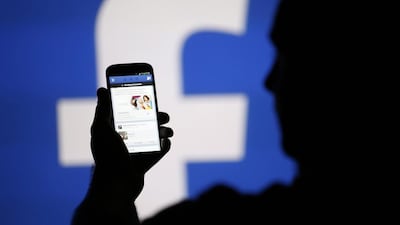ABU DHABI // Social media is more for play than work for the vast majority of users in the UAE, a survey has found.
Whether it is posting updates, taking pictures or watching videos, overall users prefer the likes of WhatsApp and Facebook to the more profession-focused LinkedIn.
According to the Social Media Survey 2016, WhatsApp and Facebook had 97 per cent and 89 per cent usage respectively, followed by YouTube with 73 per cent.
The least used platforms were Snapchat and LinkedIn with 27 per cent and 16 per cent, respectively.
Social media usage was highest among 18 to 21-year-olds.
“The results show many important facts about the uses of social media in this country by citizens and residents in different age groups,” said Sumaya Saeed, director of government communication at the Federal Competitiveness and Statistics Authority, which conducted the research.
“Both federal and local [institutes and government authorities], benefit from this research to develop and activate their presence on these platforms in order to serve the citizens and residents, and make them happy.”
The poll revealed a difference in preference for social media platforms between the 5,000 Emiratis and residents questioned.
Despite the ubiquitous use of Twitter by celebrities and newly-elected US president Donald Trump, only 35 per cent of those questioned said they used it.
Of these, 44 per cent of 18 to 25-year-olds used it most often and only 2 per cent regularly.
Free messaging service WhatsApp is by far the most used service, with 96 per cent of Emiratis, followed by 78 per cent using Instagram and 62 per cent for Snapchat.
For residents, WhatsApp also came first at 97 per cent, Facebook at 93 per cent then YouTube at 75 per cent.
Facebook was one of least popular social media platforms among Emiratis at 58 per cent.
Only Google Plus at 23 per cent had a lower usage for Emiratis compared with 61 per cent for westerners.
A quarter of expat Arabs said they used Facebook.
Young professionals were most active on LinkedIn, where those aged between 22 and 34, and 18 and 21-year-olds had the highest rate of social media usage in general.
Those aged 26 to 54 primarily used the different social media to look for jobs or for work purposes, whereas 18 to 25-year-olds were motivated more by posting pictures and updates and looking at other people’s posts or videos.
People aged 45 to 65 use it to get updates on the news.
In fact, Emiratis preferred to use social media to get information about news and social events significantly more than expats, said the report.
For residents, the primary use of social media was to connect with friends and family, people and organisations for jobs.
They also watch more videos, listen to music and look at other people’s posts more often than Emiratis.
Almost a third of those surveyed said they used social media on average two to three hours a day with 16 per cent using it more than five hours a day and 2 per cent using it less than 30 minutes a day.
Perhaps unsurprisingly a quarter of 18 to 21-year-olds polled said they used it more than five hours a day.
“Westerners spend the most amount of time on social media, while expat Asians spend the least,” said the report.
“UAE nationals have a higher tendency to disconnect from social media during family occasions.”
However just over a quarter said they could not bring themselves to ever be away from social media, with almost a third of these aged 18 to 34.
Ninety-five per cent said that social media had enhanced the quality of life, but 77 per cent also believed it was a “wastage of time” and two-third said it has resulted in a loss of the human touch in relations.
Linda Bonnar, who works with teenagers on social media issues, said the survey’s findings were interesting but she found that Instagram was becoming more popular among the people she works with.
“Many teenagers (and even some adults) will use the number of “likes” they receive on an image to equate to how popular/ attractive they are,” she said.
“The unfortunate side of this is that for so many young people these days, their self-confidence is still based on what they look like, rather than how they feel.”
LinkedIn was less popular for young people as it is focused more towards business, she said.
“Many senior students are encouraged to set up profiles as part of their university preparation and encouraged to keep them professional looking- not so much a priority compared to an IG [Instagram] account when you’re 17 or 18,” she said.
There was also a trend among young people to hold multiple social accounts with women in the Gulf with more than men, she said.
nhanif@thenational.ae

